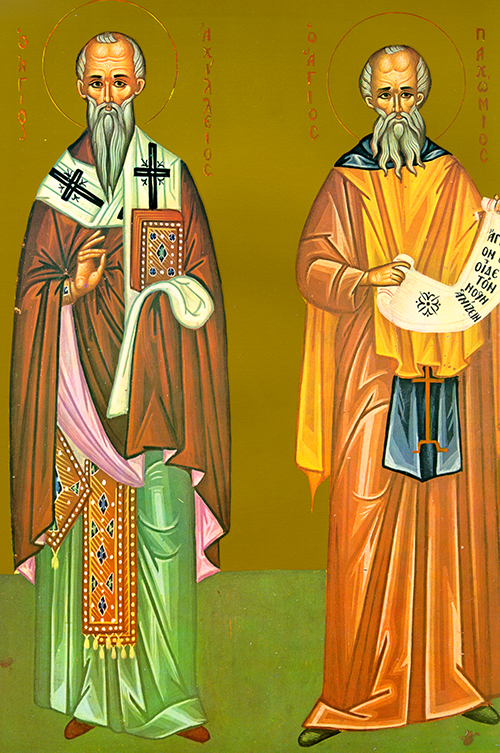

Our venerable father Pachomius the Great was a soldier in Thebaid (Upper Egypt) in the fourth century. After watching Christians feed and care for his fellow soldiers because they loved their God and wanted to fulfill His commandment to love their neighbor, St. Pachomius converted to Christianity. After his baptism, St. Pachomius led a strict ascetic life. He turned to hermit Palaemon for spiritual guidance, and received his monastic tonsure from him. After wandering in the desert, St. Pachomius heard a Voice from heaven instructing him to settle there and build a monastery. His monastery attracted many followers, and eventually there were seven monasteries with St. Pachomius as Hegumen. His older brother came and joined him at the monastery, and his sister formed a women’s monastery across the Nile from her brothers.
Your abundant tears made the wilderness bloom, and your suffering made your labors fruitful a hundredfold; you became a shining torch over the world. O venerable father Pachomius, pray to Christ our God that He may save our souls.
You became a light for the ends of the earth. You peopled the desert with monks like a city. You weakened your body by your abstinence. You took up your cross and crucified yourself. Pray unceasingly for all of us.
Acts 17: 1-9
In those days, Paul and Silas took the road through Amphipolis and Apollonia and came to Thessalonica, where there was a Jewish synagogue. Following his usual custom, Paul joined the people there and conducted discussions with them about Scripture for three sabbaths. He explained many things, showing that the Messiah had to suffer and rise from the dead: “This Jesus I am telling you about is the Messiah!” Some of the Jews were convinced and threw their lot in with Paul and Silas. So, too, did a great number of Greeks sympathetic to Judaism, and numerous prominent women.
This only aroused the resentment of the Jews, however, who engaged loafers from the public square to form a mob and start a riot in the town. They marched on the house of Jason in an attempt to bring Paul and Silas before the people’s assembly. When they could not find them there, they dragged Jason himself and some of the brothers to the town magistrates, shouting: “These men have been creating a disturbance all over the place. Now they come here and Jason has taken them in. To a man, they disregard the Emperor’s decrees and claim instead that a certain Jesus is king.” In this way they stirred up the crowd. When the town’s magistrates heard the whole story, they released Jason and the others on bail.
John 11: 47-54
At that time, the chief priests and the Pharisees called a meeting of the Sanhedrin against Jesus. They said, “What are we to do with this man performing all sorts of signs? If we let him go on like this, the whole world will believe in him. Then the Romans will come in and sweep away our sanctuary and out nation.” One of their number named Caiaphas, who was a high priest that year, addressed them at this point: “You have no understanding whatever! Can you not see that it is better for you to have one man die for the people than to have the whole nation destroyed?” He did not say this on his own. It was rather as high priest for that year that he prophesied that Jesus would die for the nation – and not this nation only, but to gather into one all the dispersed children of God.
From that day onward there was a plan afoot to kill Jesus. In consequence, Jesus no longer moved about freely in Jewish circles. He withdrew instead to a town called Ephriam in the region near the desert, where he stayed with his disciples.
Icon courtesy of Jack Figel, Eastern Christian Publications – ecpubs.com
Sunday, May 14 –